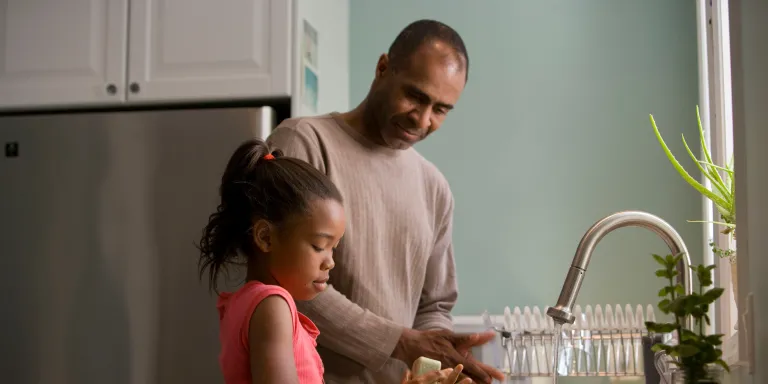
Being a new parent can be a big challenge. We’re all familiar with the shopworn cliches of life in the first six months: near-sleepless nights, increased pressure on your relationship, having much less free time than you used to, feeling the pinch when it comes to finances.
And while not all parents go through the same challenges - there can be a risk of scaremongering when it comes to telling new parents about the kind of stresses they’re ‘in for’ - it’s undeniable that some of the changes that can come with having children can be hard to deal with.
While there’s no single way to do parenting ‘right’, there are certain principles that might make those initial months and years a little easier. In fact, the idea that you can get it ‘right’ may be a good one to hold loosely from the start. Here are a few of our favourites.
Try to make time for your relationship
With everything you’ll need to be doing as new parents, the idea of making sure you also focus on your relationship with your partner might just sound like one more stress to add on the pile, but it’s not something you necessarily have to see this way.
While trying to make sure your relationship remains a priority is by no means easy - and not something you’re likely to successfully manage all the time - trying to maintain a strong and caring relationship with your partner can mean you end up with a source of strength in the face of the difficulties you may be facing.
That’s because, when times are tough, you’re more likely to need your relationship than ever. It’s at times when you feel you need support or even that you’re becoming a bit overwhelmed that having someone you can turn to - someone you know, trust and, most importantly, someone with whom you’re on good terms - becomes a big part of getting by.
When you are tired and just ground down by what might feel the sheer monotony of your circumstances it can useful to remind yourselves that this is a period that will pass. It’s not always going to be this tough; and it is often just being dog-tired that makes us forget this. Baby will learn to sleep and routine will come about; it’s a temporary period.
Making this time and spending this effort doesn’t necessarily mean managing to pull off a date night one a week in the first six months of becoming parents or having as much sex as you ever did. One of the biggest obstacles to making changes in life and in relationships is setting unrealistic goals. It’s much more likely to feel manageable if you try to make small changes and reasonable adjustments.
Keeping your relationship strong can sometimes just mean making those little gestures: an offer of a cup of tea, an affectionate touch, words of encouragement. Offering get up in the night one more time past your fair share. Sometimes, these kinds of things are enough to let your partner know that you’re still on their side and that you’re in this together.
Being forgiving of one another - and yourselves
When you’re feeling frazzled, pressured and like you’re in over your head, it’s not uncommon for your temper to become a little shorter than it is normally.
This is something we both inflict upon other people - snapping at our partners for small mistakes or habits that used to be annoying and are now totally intolerable - and on ourselves: becoming impatient with our perceived failures, speaking to ourselves harshly inside our own heads or admonishing ourselves in cruel or extreme terms.
And while this is totally understandable, it can also be a big relief - both to you and to the people you’re around - to let go of some of the expectations you may have put upon yourself, and to try to be a little more forgiving - both inwardly and outwardly.
Forgiveness can often be a pretty underrated thing. It’s often thought of as a very pious act - something we do when we’ve decided to rise above a problem and approach it from a very serene and meditative perspective. But the act of forgiveness doesn’t have to be anything quite so lofty. Sometimes it just means being willing to gently dismiss the ideas and expectations that we wanted to fulfill, and just go with what’s happening now.
In practical terms, that might mean noticing you’re not quite pulling things off as successfully as you wanted to - that naptime hasn’t quite happened at the scheduled hour, for instance, or dinner is turning into a bit of a disaster - and, instead of getting angry at yourself (or anyone around you who’ll serve as a convenient substitute), simply thinking: ‘never mind. I’m not perfect’, and carrying on. It sounds simple - maybe even a little cliche - but it can make such a big difference, especially if it becomes a habit.
Often, our ability to forgive ourselves is something that’s very much tied up in our relationship with ourselves.
Finding help where you can get it
On a more practical note, if you’re feeling absolutely shattered and like, more than anything, you just need some time off - sometimes it’s better to work smart than it is to work hard. If there’s help available to you, then it may be a very good idea to take it.
Sometimes, people don’t accept the help of family and friends when it comes to raising a new child because they don’t want to be an imposition. Sometimes, they may feel embarrassed that they need to ask for help, and may feel that they should be able to cope with things themselves. Or sometimes, it just doesn’t occur to them that the resources are available - they may not realise that that friendly couple up the street might just be totally willing babysitters for the evening, or that mum may not mind doing an extra shift this month.
Whatever the case, it can only benefit you and your partner to take the help that might be around. That might not mean taking all that much time off - perhaps there are only a few people around who might be able to help, or you may only see the right people once in a while - but sometimes taking a little break can make a bigger difference than you expect.
Twenty four hours to recharge (even if that just means going to bed early one night) can mean you don’t only feel more energetic, but more optimistic too. Sometimes, the objective with taking a break isn’t completely getting back to 100%, but just allowing yourself to feel things are more manageable for the time being.
How we can help
If you’re looking for support with your relationships, we can help. We offer a range of ways to speak with a trained relationship expert including ongoing counselling, 30 minute web and phone chats, and one session therapy.
Find out which service is right for you
How you can help
Have you found this advice helpful? Make a donation to help us reach more people and continue supporting the nation’s relationships:
Can't afford to donate? We understand. Instead, we ask that you leave us a 5 star review on Trustpilot.
